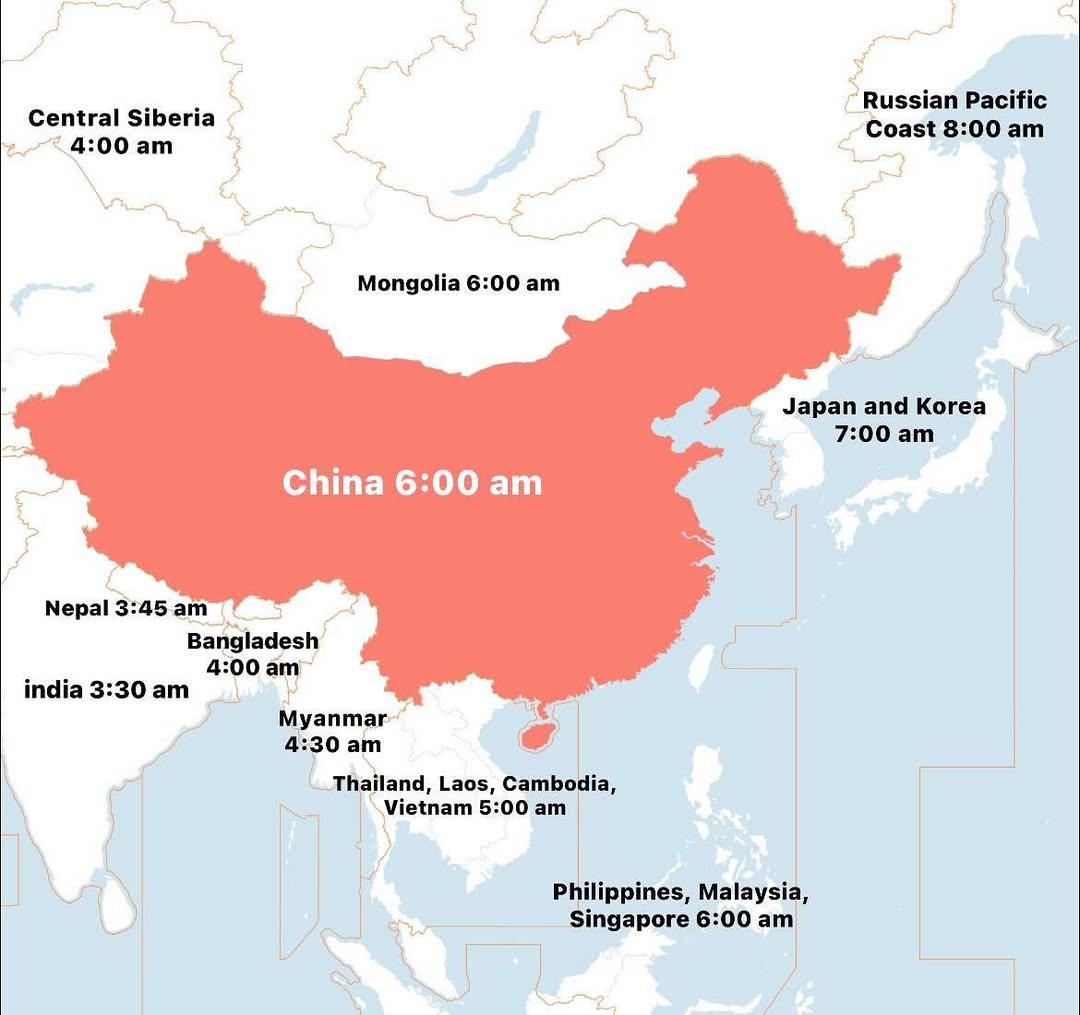Chinese Time Zones Map


David Chen
Data Visualization Specialist
David Chen is an expert in transforming complex geographic datasets into compelling visual narratives. He combines his background in computer science ...
Geographic Analysis
What This Map Shows
This map displays the various time zones across China, a country known for its vast geographical expanse and cultural diversity. While many people might think of China as a singular time zone, the reality is more complex. The map clearly delineates the official time zone, China Standard Time (CST), and indicates regions that operate on different local times, reflecting the historical and cultural nuances of this immense nation.
Deep Dive into Chinese Time Zones
China is the fourth-largest country in the world by area, spanning roughly 9.6 million square kilometers. Due to its size, the country would logically span several time zones. However, since 1949, the People’s Republic of China has officially used a single time zone, China Standard Time (CST), set at UTC+8. This decision was partly a political move to unify the country under a common time and to facilitate communication and transportation across its vast territory.
Interestingly, despite the official stance, several regions in China operate on unofficial local times. For instance, Xinjiang province, located in the far northwest, is home to a significant population of ethnic Uyghurs who often follow a time schedule that is two hours behind CST. This means that while the clock in Beijing might read 3 PM, it could be just 1 PM in parts of Xinjiang. This difference can lead to fascinating situations where local customs and social rhythms clash with the official time.
In addition to Xinjiang, other regions, including Tibet and parts of Inner Mongolia, exhibit similar practices. These unofficial time zones reflect the cultural identities and lifestyles of the people living there. It's an intriguing example of how geography and culture can influence the everyday lives of individuals, even in a highly centralized state like China.
What’s fascinating is that time zones are not just about clocks; they influence everything from business operations to school schedules and even social gatherings. Time, after all, is a significant part of daily life, and when it comes to a nation as diverse as China, the implications of a single time zone can be profound. The debate over time zones in China is more than just a matter of convenience; it touches on issues of identity, autonomy, and governance.
Regional Analysis
When dissecting the time zone situation by region, it’s essential to understand how geography plays a role. Eastern China, which includes major cities such as Beijing, Shanghai, and Guangzhou, adheres strictly to CST. This region is densely populated and economically vital. The uniformity of time in this region supports its bustling economy and fast-paced lifestyle.
Conversely, in the western regions like Xinjiang and Tibet, the time zone variations lead to a different rhythm of life. For instance, in Xinjiang, where local practices can deviate significantly from CST, businesses may open later in the day, and social activities often begin in the evening. This difference not only affects daily life but impacts economic interactions with the eastern provinces, leading to potential misunderstandings and logistical challenges.
Moreover, in regions with significant ethnic diversity, such as Inner Mongolia, the local population may prefer to follow their traditional schedules, which can differ from CST. Here, time becomes a representation of cultural identity and autonomy, showcasing the rich tapestry of ethnic cultures within China.
Significance and Impact
Understanding China's time zones is vital for several reasons. For one, it highlights the complexities of governance in a country that spans such significant geographic and cultural divides. The implications of a single time zone are significant, as they can lead to tension between the central government and local populations, particularly in regions with strong cultural identities.
Moreover, as China continues to grow as a global economic powerhouse, the effects of time zone variations are increasingly relevant for international business. Companies engaging with Chinese markets must navigate these complexities, ensuring that they are aware of local practices to foster effective communication and operations.
Looking to the future, discussions around time zones in China might gain more attention. As urbanization continues and economic ties expand, the need for a more flexible approach to timekeeping may arise. Will China eventually embrace multiple time zones to reflect its diverse geography and culture? Only time will tell, but the conversations surrounding this topic are likely to evolve as the country continues to develop.
Visualization Details
- Published
- September 19, 2025
- Views
- 42
Comments
Loading comments...